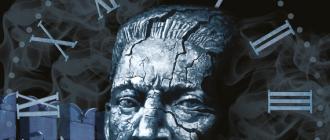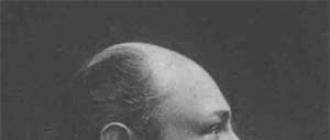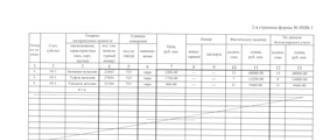27.11.2014
An article is a word that defines a noun.
IN English There are two types of articles: definite (the) and indefinite (a/an).
Based on the names, the indefinite article is used when we are talking about a phenomenon that we encounter for the first time, an object in general, and the definite article is used when we are talking about something specific, or something that has already been encountered in a conversation.
The concept of the article is present in many languages of the world, but in the same number of languages it is absent.
Therefore, do not panic if in your native language articles are not used.
The data will help you make fewer mistakes when speaking English.
It is very important to be able to use the correct articles in your speaking or writing.
1. With the names of countries and continents
In this case we do not use articles at all, BUT if the name of the country consists of parts, such as, USA, UK, UAE, then our article appears the, and it will be: the USA, the UK, the UAE, the Czech Republic, the Netherlands.
This also applies to continents and islands: usually we do not use the article, but if the name is a composite name, the definite article takes place.
For example: Africa, Europe, Bermuda, Tasmania BUT the Virgin Islands, the Bahamas.
- She lived in America.
- They live in England.
- My friend is from the Czech Republic.
2. With the words breakfast, dinner, lunch
When talking about eating in general, there is no article. But if you're talking about a specific breakfast, dinner or lunch, use the.
For example:
- I don't eat breakfast.
- We didn't like the dinner.
3. With names of work, profession
In this case the indefinite article is used a/an.
For example:
- I want to be a politician.
- My younger brother wants to be a vet.
4. With the names of the cardinal points
Usually the names of the cardinal directions are written with a capital letter, so they are easy to recognize: the North, the South, the East, the West .
True, if a noun indicates a direction, then it should be used without an article and written with a small letter.
For example:
- They went east.
- The North is cooler than the South.
5. With the names of oceans, seas, rivers and canals
Remember that the definite article is always used with the names of these bodies of water.
For example: The Amazon, the Indian Ocean, the Red Sea, the Suez Canal .
- I would like to swim in the Red Sea, and you?
- The Amazon is the longest river in the world.
6. With names of unique phenomena
This means that a phenomenon or object exists in one copy, one of a kind, in particular, the sun, the moon, the inter net , the sky , the earth.
For example:
- The sun is a star.
- We looked up at all the stars in the sky.
- He is always on the internet.
7. With uncountable nouns
This category of nouns implies those units and concepts that we cannot count. Plus, as an identifying mark in most cases, they have no ending –s– plural indicator.
But do not forget that there are ten exceptions to one rule, that is, if you are talking in general about some uncountable concept, there will be no article, but again, if the case is particular, use the.
For example:
- I like bread/milk/honey.
- I like the bread/the milk/the honey. (Specifically this and nothing else.)
8. With last names
If we are talking about members of the same family, you can put article the before the last name. This way you define a group of people, a family, in one word.
For example:
- The Smith are coming for dinner today.
- Have you seen the Johnson recently?
These are not all the uses of articles in English. However, first remember these rules, gradually deepening your knowledge
At the school for new Russians they teach English. Teacher:
- Listen, guys, if there is no article, then it is translated as “type”, if there is a definite article, then it is translated as “specifically”!
This anecdote perfectly reflects the essence of the use of articles in the English language.
First, let's find out what an article is:
If we talk in simple words, article is a kind of “label”, a companion to a noun. He stands in front of it and makes it clear that this is a noun, and not a verb or an adverb. Sometimes the article is very difficult to understand. Because there is no article in the Russian language, and therefore it cannot be translated into Russian. To do this, you need to feel very well the nuances of the meaning of a sentence that speaks of an object as “type” or still as “specifically” in order to understand which article will be used.
In general, this is an acquired taste; over time, you will feel which article to use without even thinking, as if it were a matter of course.
Where do articles come from?
There are two articles in English: the indefinite articles “a” and “an” and the definite “the”. The article “a” used to mean “one”; in fact, it came from the numeral “one”. Knowing this, it is easy to remember that the indefinite article is used before nouns exclusively in singular.
The article “the” used to have the meaning “this, this, this”, etc., and was a demonstrative pronoun. Nowadays demonstrative pronouns “this, that” are used. And to the article “the” you can add some clarification “exactly this one”. Those. Knowing the origin and original meaning of the definite article, it is easy to remember that “the” should be used if you want to emphasize that we are talking about EXACTLY this object.
By the way, if you are in doubt about which article to put and whether to put it, then you can get by with modern demonstrative pronouns “this, that, those, these”.
In grammar you can sometimes come across such a concept as "zero article". This means that the article does not need to be placed before the noun, it is omitted. Most often the article is not placed before uncountable nouns, such as sugar, salt, flour, fish, etc., although in some cases the article can be omitted before countable nouns.
For example: A cat runs across the street.
A cat is running across the street.
One cat runs across the street.
And now like this:
Now the cat is sitting on the bench.
Now the cat is seating on the bench
How to understand the context:
Now (exactly that) cat (which just crossed the road) is sitting on the bench.
In any case, there are several rules that will make it easier for you to learn where and what article to use.
Memo: Frequently used phrases with “to have”, “to” have got", "there is", "there are".
I have a beautiful doll.
He has got a hockey-ball.
There is an apple on the tree.
There are dogs in the yard.
The article is omitted because there are some dogs in the yard. Sometimes you can use the definite article “the” before the noun “dogs”. But if in doubt, you can use the words “substitutes”; they are very helpful. For example:
There are several dogs in the yard.
There are many dogs in the yard.
There are six dogs in the yard.
There are several more expressions that are learned by heart. This: A lot of - a lot
The rest of – the rest
You also need to remember that “the” is used with circumstances of place, i.e. objects where a person (animal, thing, etc.) is, where he is going, etc. For example:
I came into the room to take my notebook.
Here “room” is an object where a person has entered.
Or like this: There are a lot of birds in the garden.
The definite article is also used with the names of objects that are somehow related to water:
Lakes: the Loch Ness;
Rivers: the Thames;
Seas: the Mediterranean Sea;
Oceans: the Pacific Ocean.
The definite article is also placed before names that are used only in the plural:
Netherlands - the Netherlands;
A chain of mountains, for example, the Alps - the Alps;
Or so the Black family – the Blacks. Or maybe the Ivanov family – the Ivanovs.
In any case, you can figure it all out, especially if you read more. Because the more you read, the faster you learn different phrases and the better you feel the language.
Hello my wonderful readers!
You can probably guess what word English speech the most commonly used, right? Of course it is article "the". And today we will analyze where its use in English is appropriate and where it is not. We will study the rules for its use, look at numerous examples, and analyze a table with set expressions that you can always have at hand. And then you can go to and to consolidate everything you've learned here.
Go ahead, friends!
A little grammar
If the article “a” (more about it!) is used only with nouns that can be counted, then “the” is used with all nouns: and in singular and plural; with both countable and uncountable objects .
By the way, the pronunciation of the article also changes depending on which letter the next word begins with. If the word begins with a consonant, then the article is pronounced as [ðə], for example the banana - banana. But if an object begins with a vowel, it is pronounced like [ði], for example, the apple - apple.
When to use
- If in speech or writing subject already mentioned, then in the future you can use this article with it.
I received an e-mail from my friends. The letter told me that they would visit me on the weekend.- I received a letter from my friends. The letter said that they would visit me on the weekend.
- With unique items that are one of a kind, we also use the - the sun, the moon, the Earth.
The moon today is extremely beautiful.- The moon is incredibly beautiful today.
- WITH geographical names The article has a very special relationship. With names rivers, deserts, oceans, island groups and mountain ranges We can confidently use the article, but we must not forget about exceptions. I talk about them in great detail.
The Atlantic Ocean is the most beautiful ocean on the planet.- The Atlantic Ocean is the most beautiful ocean on the planet.
The Comoro Islands attract lots of tourists every year.- The Comoros Islands attract many tourists every year.
- With titles hotels, cinemas, ships, museums, galleries and newspapers We most often also use the definite article.
The Hilton hotel is about to open in our city.- A Hilton hotel is about to open in our city.
The Louvre is the most attended museum in Europe.- The Louvre is the most visited museum in Europe.
- With adjectives in highest degree comparisons: the most, the best, the worst.
The most beautiful place I’ve ever been is Japan in spring.- The most beautiful place the best I've ever seen is Japan in the spring.
The best books I’ve ever read were about Harry Potter. - Best books that I read is Harry Potter.
- With musical tools and names dancing.
The violin is my most beloved musical instrument.- The violin is my favorite musical instrument.
The contemporary has become very popular among dancers some years ago.- Contempo became very popular among dancers several years ago.
When not to use
Knowing when the definite article is used is extremely important, but it is also equally important to know when it is used. Not used.
- WITH plural nouns that can't be counted when we tell something general.
Trees produce oxygen.- Trees produce oxygen. (Any trees, in general)
- With names own and before names we never use it.
Jinny is very talented. She can play 3 different musical instruments.- Ginny is very talented. She can play three different instruments.
- With titles countries, cities, streets, parks, mountains, lakes, bridges and islands we try to avoid it.
Spain is mostly famous for its football club Barcelona. - Spain is mainly known for its football club Barcelona.
I dream of climbing Everest.- I dream of climbing Everest.
- With names sports, activities, games, colors, days, months, drinks, lunches he's not friendly.
I can speak Turkish a little.- I can speak a little Turkish.
I was born in July. - I was born in July.
My favorite color is green. - Green is my favorite color.
- If we have pronouns this, that, those- We Not we use "the". In addition, with possessive We also do not use pronouns (and the possessive case in general!).
This the ball was signed by a famous football player.- This ball was signed by a famous football player.
Kathy's dress is ready. I've already cleaned it.- Casey's dress is ready. I cleaned it yesterday.
- With words school, church, hospital, college, university, court, prison we use it or we don't use it depending on the meaning. Let's see an example:
I go to school from Monday to Friday.- I go to school from Monday to Friday. (as a student)
My mother went to the school for a meeting. - My mother went to school for a meeting. (As a parent, not as a student)
- With titles diseases we can also use or do not use article.
I've got (the) flu. - I got sick.
Set expressions
Both the and a form stable expressions that cannot be changed in any way. So let's get to know them (By the way, if you need general information about articles in the English language, then you).
I am sure that now that you have a hint in the form of a table and structured rules in your hands, it will be much easier for you to master the ones that I have prepared for you. And after them you can move on. Practice as much as possible, study, learn new rules and improve your English.
And I’m ready to help you with this. The materials on my blog are constantly updated, and my subscribers receive them even before they appear on the site. I’m waiting for you there to share important materials with the very first.
And for today I say goodbye.
- When it is clear from the previous context or from the situation what object, phenomenon, etc. we are talking about, or when we mean a specific object, etc., known in the situation to the speaker and the listener, or when this noun has already at least previously mentioned once in this context.
Close the door, please. Close the door please.
(specific, this door, the door in the room in which the speaker is or which he means situationally).
Ann is in the garden. Anna (is) in the garden (which is near the house, in the one known to us, etc.).
Please pass me the wine. Please pass me the wine (the one on the table).
A car struck a tree. You can see the mark on the car and the tree. The car hit a tree (some car hit some tree). Traces of what happened are visible on (this) car and on (that) tree. - Before a countable noun in the singular, which means an animate or inanimate object as a representative of an entire class, category or group, that is, an object that expresses the general in a single concept.
The Honor is the king of beasts. Leo is the king of beasts (all lions).
The young man must be polite. A young man must be polite (a young man representing the younger generation). - Before nouns that are unique in their gender:
the Earth - Earth, the Sun - Sun, the sky - sky.
- Before nouns that have a definition with them, expressed by a attributive restrictive phrase, sometimes with the preposition of.
The water in the river was very cold. The water in the river (the water in this river) was very cold.
The girl in blue stood by the window. The girl in blue (the girl in blue, not red or white) stood by the window.
The English teacher of our group was ill. Our group's English teacher was sick. - Usually before nouns:
- which are determined by adjectives in the superlative degree (meaning “most”).
He is the best student in our group. He is the best student in our group.
- which are used with definitions expressed by the words same - the same, very - the same, only - the only one, next - the next, last - the last.
Read the same text. Read the same (same) text.
You are the very man I am looking for. You are (exactly) the (very) person I am looking for.
The next day we went to Moscow. The next day we went to Moscow.
- which are determined by adjectives in the superlative degree (meaning “most”).
- Before nouns denoting the names of rivers, seas, oceans, mountain ranges, ships, newspapers, some states, cities, as well as before proper names in the meaning of an entire family:
the Volga - Volga, the Black Sea - Black Sea, the Pacific Ocean - Pacific Ocean, the Alps, the “Kurchatov” - “Kurchatov” (name of the ship), the “Pravda” - “Pravda” (newspaper), the Ukraine - Ukraine, the Smirnovs - the Smirnovs (the entire Smirnov family or the Smirnov husband and wife).
- Before titles musical instruments, when we mean a given type of instrument in general, and not a unit, one of them.
She learns to play the flute. She is learning to play the flute.






